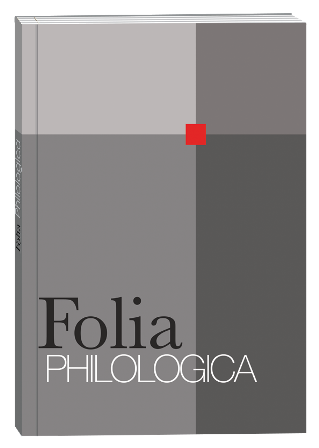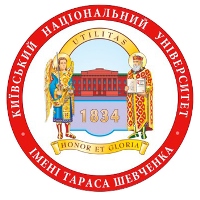FEATURES OF NUMERAL EXPLICATION OF A QUANTITATIVE FEATURE IN UKRAINIAN LANGUAGE
DOI:
https://doi.org/10.17721/folia.philologica/2021/1/4Keywords:
attributive words, Numeral, static sign, nominal part of a compound predicate, Ukrainian languageAbstract
The article investigates the part-of-speech class of Numerals as class of attributive words in semantic and grammaticaldimensions in Ukrainian. The peculiarities of the explication of a static feature by Numerals with a quantitative-substantivemeaning in Ukrainian language are clarified.The purpose of the article is to clarify the originality of the functions of numerals as expressions of quantitativesubjectrelations in Ukrainian. Realization of the set purpose provides the decision of such problems, in particular: 1) to find out functions of the Numeral as an attributive word; 2) outline the parameters of Ukrainian Numerals in a staticfeature expression; 3) determine the features of the use of the Numeral in the functionally secondary formal-syntacticposition of the compound nominal predicate.Scientific novelty. The article defines the status of the Numeral as an attributive word in the hierarchy of part-ofspeechclasses – expressions of a static feature in Ukrainian language. As an attributive word, the Numeral functionsin the adnominal position, ie as an expression of quantitative-subject relations (quantitative function), but its static signdiffers from the adjective: it gives a quantitative description of someone or something. The attributive function inherentin the agreed Attribute is performed by Numerals in all indirect cases, except for the accusative. In its second nominativefunction – numerative – the Numeral is likened to a Noun and acquires the meanings of its morphological categories.In conclusion, the article emphasizes that the Ukrainian Numeral, being in the peripheral positions of a sentenceand transmitting, respectively, a static feature with a quantitative-substantive meaning, is the carrier of the secondaryfunction of attributive words. In addition to the genetically primary adjectival position, in which the Numeral determinesthe quantitative trait of someone or something, it is used in the functionally secondary formal-syntactic positionof a compound nominal predicate with the main numeral part, into which it falls through verb conjunctions elements. Sucha predicate is a formal-grammatical representative of a predicate of quantity (quantitative state), for which one valenceposition is typical – the subject of a quantitative sign.
References
Arpolenko, H. (1980). Chyslivnyk ukrainskoi movy: monohrafiia [Numeral of the Ukrainian language: monograph]. Kyiv: Nauk. Dumka [in Ukrainian].
Vykhovanets, I. (1988). Chastyny movy v semantyko-hramatychnomu aspekti: monohrafiia [Parts of speech in the semantic-grammatical aspect: a monograph]. Kyiv: Nauk. dumka [in Ukrainian].
Vykhovanets, I. (1992). Narysy z funktsionalnoho syntaksysu ukrainskoi movy: monohrafiia [Essays on the functional syntax of the Ukrainian language: a monograph]. Kyiv: Naur. Dumka [in Ukrainian].
Vykhovanets, I. (2004). Osnovni pytannia morfolohii. Imennyk. Prykmetnyk. Chyslivnyk. Zaimennykovi slova. [The main issues of morphology. Noun. Adjective. Numeral. Pronoun words]. In: Vykhovanets, I., Horodenska, K. Teoretychna morfolohiia ukrainskoi movy: Akad. hramatyka ukr. Movy – Theoretical morphology of the Ukrainian language: Acad. grammar ukr. language. Kyiv: Univ. vyd-vo "Pulsary" [in Ukrainian].
Horodenska, K. (2002). Semantychnyi i morfolohichnyi potentsial predykativ kilkosti [Semantic and morphological potential of influence predecessors]. Naukovyi visnyk Volynskoho derzhavnoho universytetu im. Lesi Ukrainky – Lesya Ukrainka Eastern European National University Scientific Bulletin, 5, 23–26 [in Ukrainian].
Huivaniuk, N. (1997). Spivvidnoshennia obiektyvnoi ta subiektyvnoi modalnosti v rechenni: navch. pos. [The ratio of objective and subjective modality in the sentence: a textbook]. Chernivtsi: Ruda [in Ukrainian].
Kostusiak, N. (1998). Katehoriia stupeniv porivniannia u hramatychnii systemi ukrainskoi movy: avtoref. dys. na zdobuttia nauk. stupenia kand. filol. nauk [Category of degrees of comparison in the grammatical system of the Ukrainian language: abstract of the dissertation for the degree of Candidate of Philological Sciences]. Kyiv [in Ukrainian].
Kurylovych, E. (1962). Zametki o znachenii slova [Notes on the meaning of the word]. Ocherki po lingvistike: sb. statey – Essays on linguistics: collection of articles. Moscow: Іzdatelstvo inostrannoy literaturyi [in Russian].
Mezhov, O. (1998). Subiektni syntaksemy u strukturi prostoho rechennia [Subjective syntaxes in a simple sentence structure]. Lutsk [in Ukrainian].
Pliushch, M. (1986). Katehorii subiekta i obiekta v strukturi prostoho rechennia [Subject and object categories in a simple sentence structure]. Problemy hramatyky i leksykolohii – Problems of grammar and lexicology. Kyiv [in Ukrainian].
Sunyk, O. (1968). Voprosyi obschey teorii chastey rechi [Questions of the general theory of parts of speech]. Voprosyi teorii chastey rechi: na materiale yazyikov razlichnyih tipov – Questions of the theory of parts of speech: on the material of languages of various types. Leningrad: Nauka [in Russian].
Suprun, A. (1969). Slavyanskie chislitelnyie: stanovlenie chislitelnyih kak osoboy chasti rechi [Slavic numerals: the formation of numerals as a special part of speech]. Minsk: Izdatelstvo Belorusskogo universiteta [in Russian].









